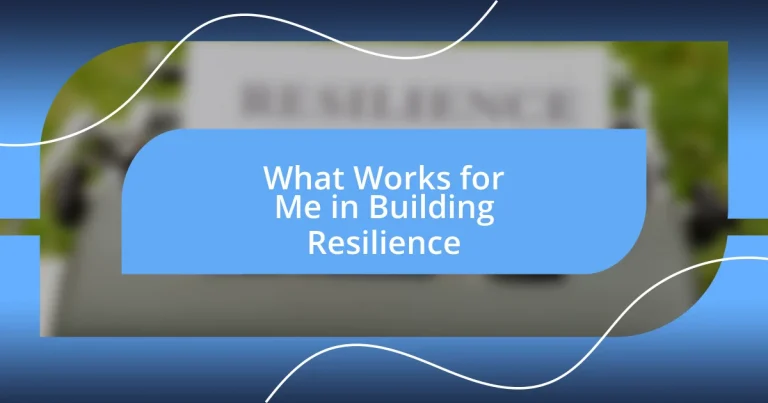Key takeaways:
- Resilience is about embracing challenges, learning from experiences, and understanding emotional responses.
- Key habits to build resilience include practicing mindfulness, maintaining a strong support network, and setting small, achievable goals.
- Reflecting on personal experiences and setting realistic, flexible goals can enhance emotional strength and reduce stress.
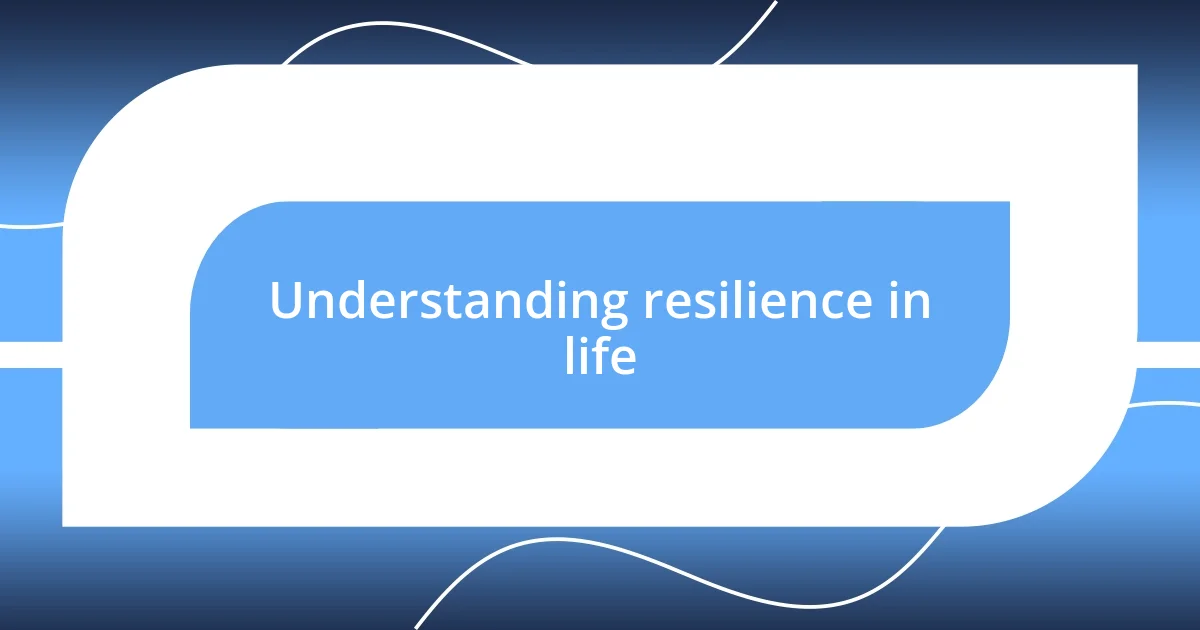
Understanding resilience in life
Resilience is the ability to bounce back from adversity, and I’ve seen how this plays out in my life. When I faced a significant setback in my career, I realized that resilience wasn’t just about enduring hardship; it was about finding meaning in the struggle. Have you ever wondered how some people seem to thrive under pressure while others crumble?
I’ve learned that resilience involves a blend of mindset and action. For instance, when my plans for a big project fell through, instead of sulking, I took a moment to reflect on what that taught me. The ability to adjust and learn from experiences is a crucial part of resilience—it’s like building a muscle that gets stronger with each challenge. Doesn’t it feel empowering to turn a setback into an opportunity for growth?
On a deeper level, resilience encompasses emotional awareness. I remember a time when I felt overwhelmed by life’s demands, and I had to pause and really check in with my feelings. Recognizing when to seek support or simply acknowledge my emotions was key in those moments. How do you handle your emotions when life gets tough? For me, understanding my emotional responses has been a vital step in cultivating my resilience.
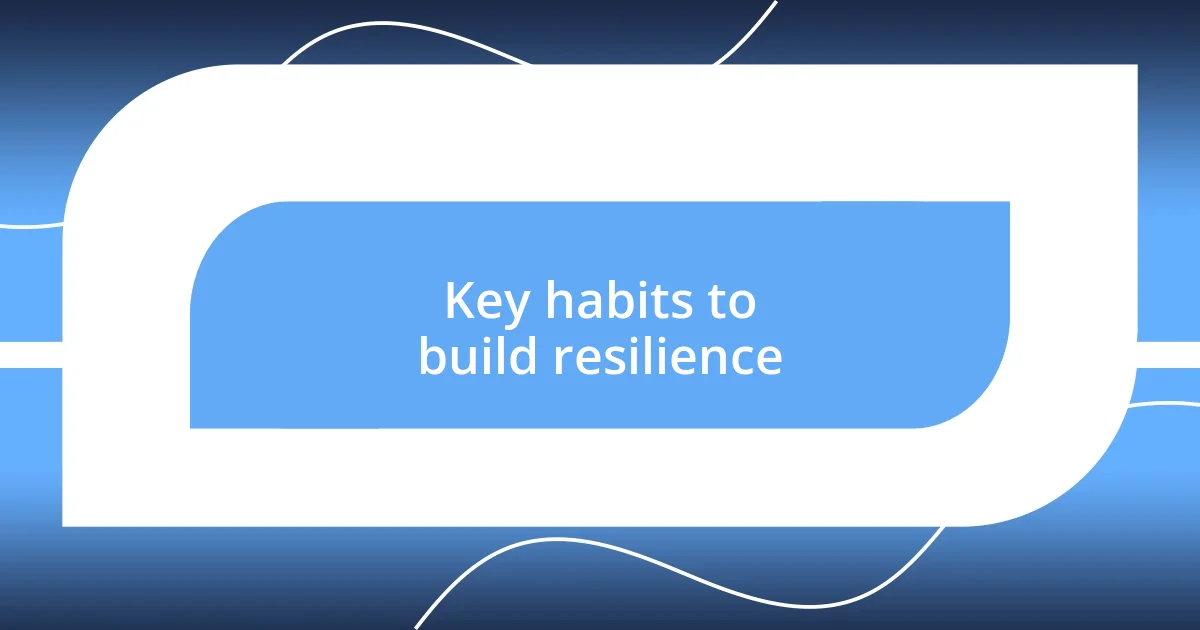
Key habits to build resilience
One habit I’ve found indispensable in building resilience is practicing mindfulness. Whenever I feel the weight of stress pressing down on me, I carve out a few minutes to sit quietly and focus on my breath. This simple act grounds me and allows me to observe my thoughts without judgment, which can radically shift my perspective. Have you ever noticed how a moment of stillness can make you feel more in control? For me, it’s like recalibrating my internal compass.
Another key habit is maintaining a strong support network. When I went through a challenging personal transition, reaching out to friends and family became my lifeline. I found that sharing my challenges, rather than bottling them up, not only lightened my emotional load but also opened doors to new ways of thinking. Have you ever turned to a friend during tough times? Those moments of connection can be profoundly comforting and informative.
Lastly, setting small, achievable goals plays a significant role in strengthening resilience. I discovered this when I decided to tackle a daunting task by breaking it into smaller steps. Each time I completed a step, I felt a surge of confidence that propelled me forward. It’s fascinating how small victories can fuel your desire to continue pushing through adversity, right? I believe that cultivating these habits can significantly bolster our resilience in the face of life’s ups and downs.
| Habit | Description |
|---|---|
| Mindfulness | Taking moments to focus on breath and thoughts for a clearer perspective |
| Support Network | Connecting with friends and family to share challenges for emotional relief |
| Small Goals | Breaking tasks into tiny, achievable steps to build confidence |
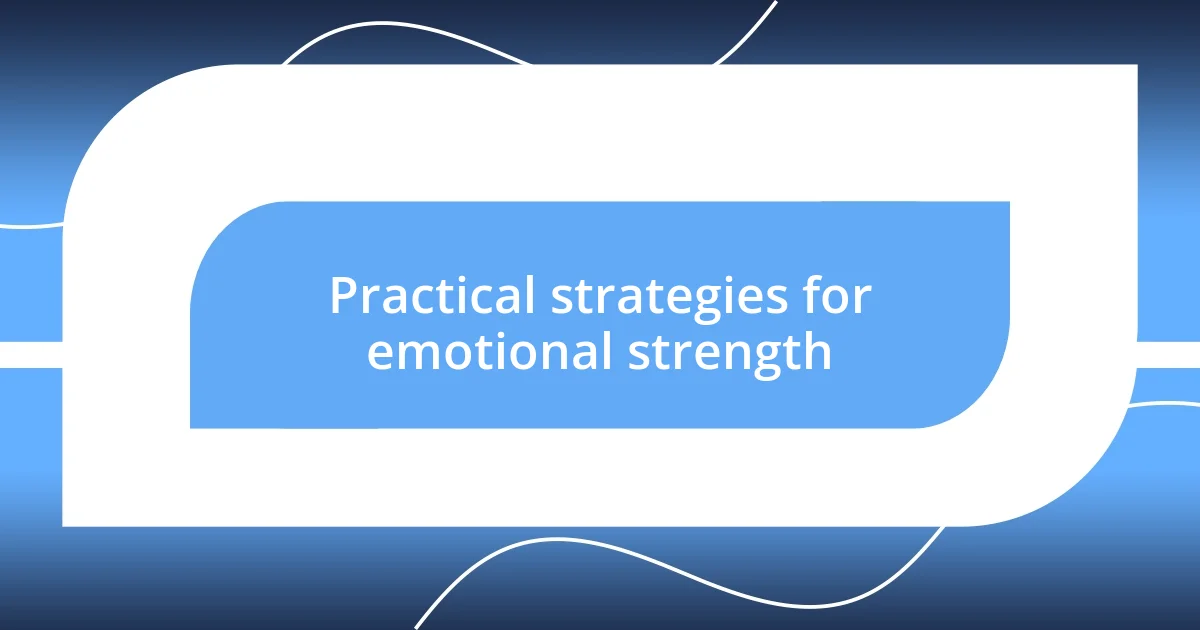
Practical strategies for emotional strength
One practical strategy I’ve found incredibly valuable for emotional strength is journaling. This practice offers a safe space to pour out thoughts and feelings without judgment. There were days when I felt overwhelmed, and taking a few minutes to write about my experiences helped unveil patterns I wasn’t aware of. It’s surprising how clarifying your emotions on paper can lead to a deeper understanding of what you’re going through. Have you ever felt lighter just by putting pen to paper?
Another great approach is actively cultivating gratitude. During a particularly challenging period in my life, I started a gratitude jar. Each day, I would write down one thing I was thankful for. This simple act shifted my focus from what was lacking to the abundance already present in my life. It taught me to recognize the silver linings amid chaos.
Here are some strategies that I’ve experienced as effective for building emotional strength:
- Journaling: Writing down thoughts to process emotions and gain clarity.
- Gratitude Practice: Identifying and writing about things to be thankful for on a daily basis to foster positivity.
- Mindful Breathing: Learning to control my breath during stressful moments to regain composure.
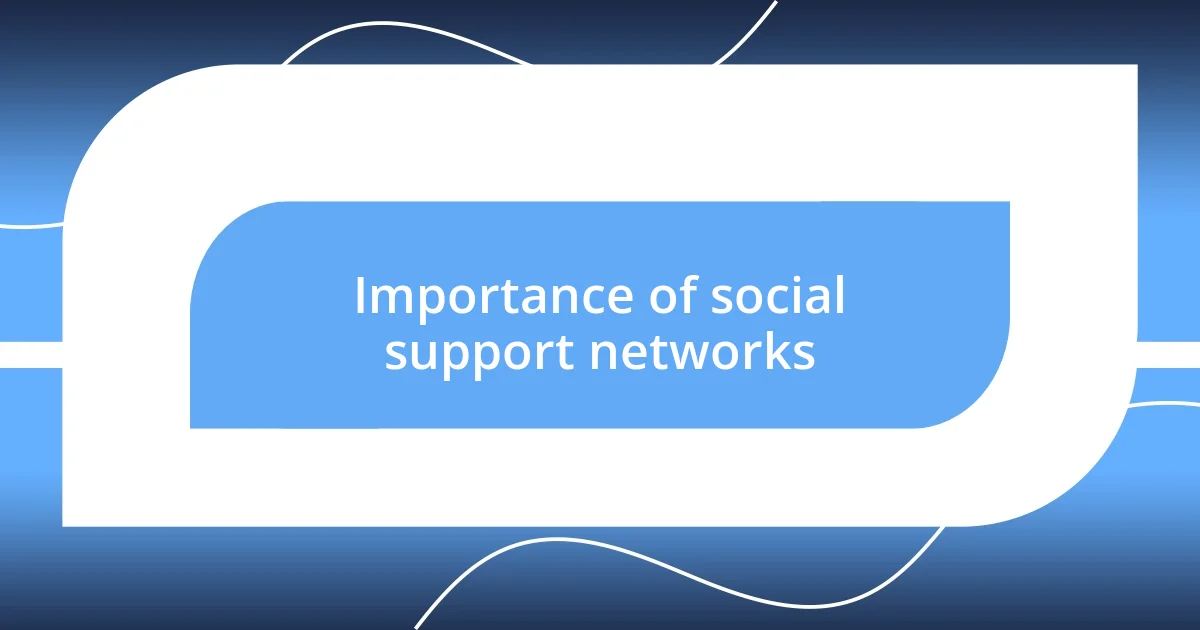
Importance of social support networks
Social support networks are like lifelines during tough times. I remember a period when I felt completely overwhelmed, and it was my friends who stepped in with unwavering support. Just knowing they were there for me made a world of difference, didn’t it? It’s not merely about having people around; it’s about feeling understood and valued, which is crucial for building resilience.
There are those moments when the world seems heavy, and I often remind myself to lean on my circle. One evening, while sharing my feelings over coffee with a close friend, I found that just talking about my struggles helped ease the burden. It wasn’t about finding solutions right away; it was about knowing someone could listen. Have you experienced that comfort when sharing your worries with someone you trust? It’s truly liberating.
In my view, the role of social support cannot be overstated. Engaging with others not only provides emotional relief but also encourages fresh perspectives. When I’m surrounded by supportive people, I often find that my worries seem less daunting and more manageable. Isn’t it amazing how a simple conversation can illuminate new paths and options that you hadn’t even considered before? Building and nurturing these connections has been a key aspect of my journey toward resilience.
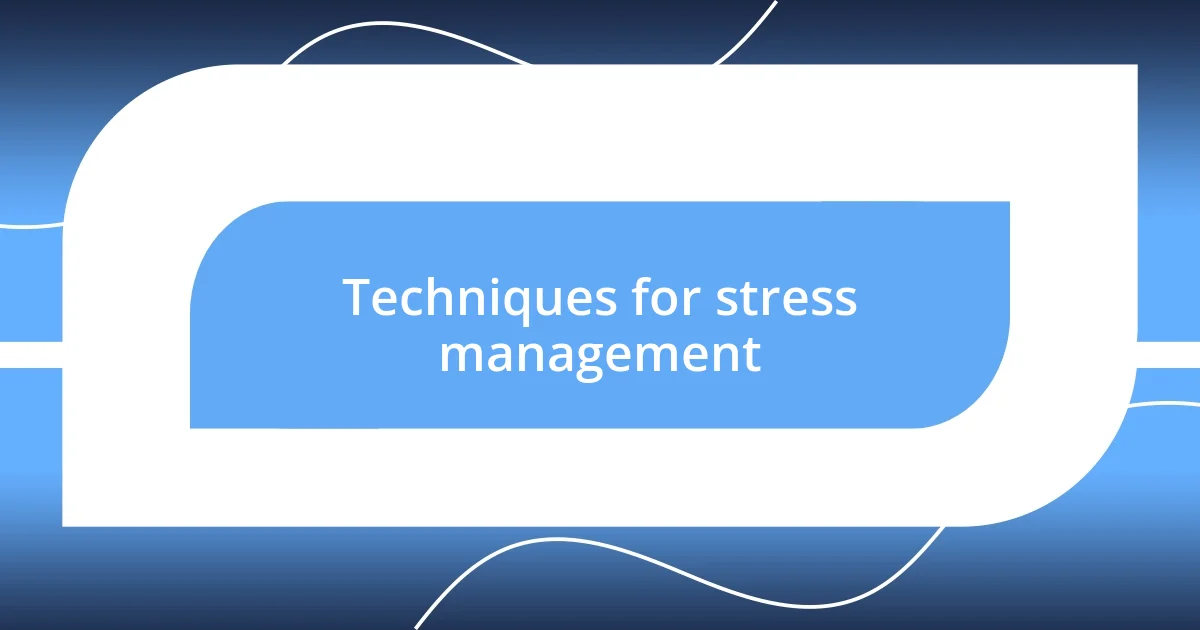
Techniques for stress management
Managing stress effectively is essential for maintaining resilience, and I’ve found that incorporating physical activity into my routine works wonders. When I feel the pressure mounting, a brisk walk or a short workout makes a significant difference. It’s incredible how moving my body helps to release pent-up energy and clear my mind. Have you ever noticed how a few minutes of movement can completely shift your mood?
Another technique that’s been transformative for me is practicing mindfulness. I remember a particular moment during a hectic week when I took just five minutes to sit in silence and focus on my breath. In that stillness, I noticed the chaos around me didn’t have to dictate my inner peace. Learning to anchor myself in the present moment has equipped me to handle stress with a more measured response rather than reacting impulsively.
I also find that laughter truly is a great stress reliever. Recently, I watched a hilarious comedy with friends, and I realized how much lighter I felt afterward. Laughter can be spontaneous, but making time for humor—whether it’s a funny show or a light-hearted chat—plays a vital role in breaking the tension. Isn’t it refreshing to embrace joy, even in moments of stress?
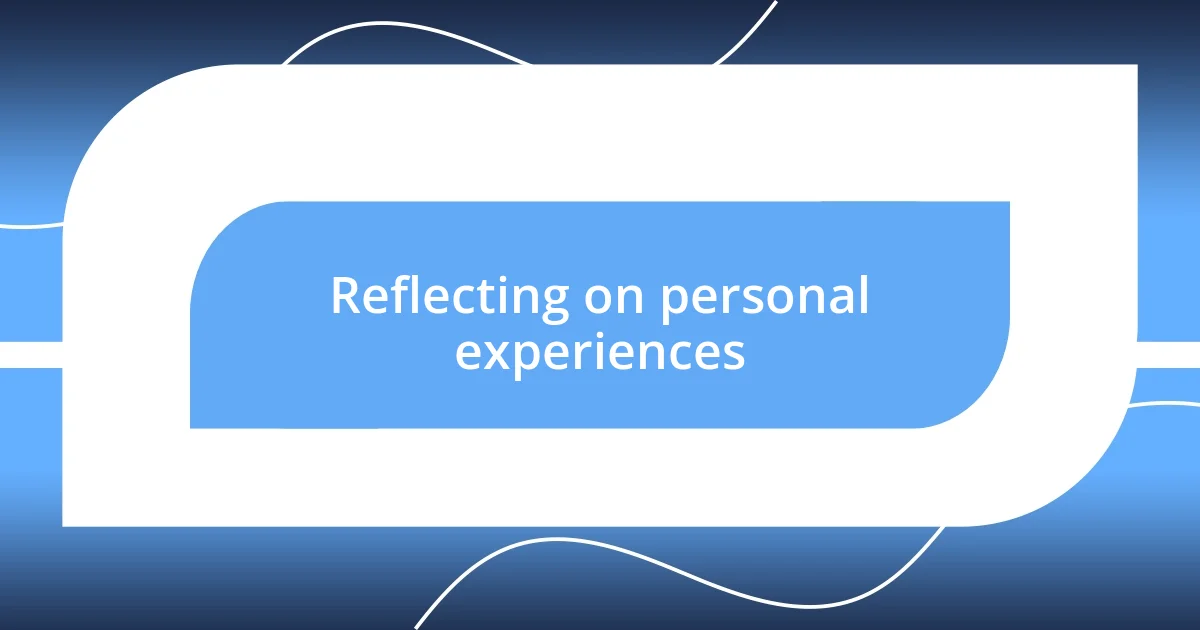
Reflecting on personal experiences
Reflecting on personal experiences has been nothing short of enlightening for me. One afternoon, while journaling about my challenges, I stumbled upon a pattern: moments of self-doubt often stemmed from my past failures. I realized that recognizing these experiences helped me build a much stronger foundation, as I could see how far I’d come. Isn’t it fascinating how looking back can provide clarity and fuel our growth?
I also cherish the times when I’ve taken a step back to evaluate how resilience has shaped my life. Thinking about a particularly difficult period in my career, I recall feeling lost. It wasn’t until I reflected on how I navigated that turbulence that I understood the strength I had within me. Have you taken the time to reflect on your own journeys? It can be eye-opening to acknowledge the resilience we’ve already demonstrated.
There’s a certain power in vulnerability that I’ve come to appreciate through reflection. I recall sharing my story during a workshop and watching others resonate with my struggles. It was a profound moment that highlighted how our personal experiences can foster connections and inspire resilience in others. Have you ever found strength in sharing your story? When we open up, we not only empower ourselves but also uplift those around us.
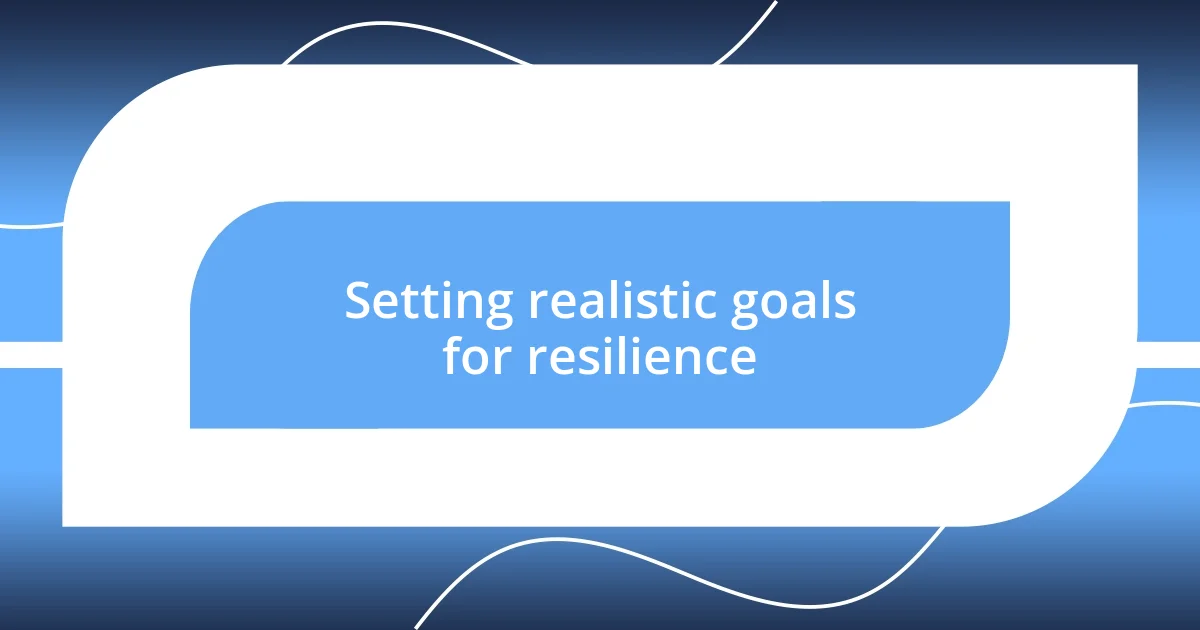
Setting realistic goals for resilience
Setting realistic goals is a vital step in building resilience. I’ve learned that setting small, attainable goals not only keeps me focused but also prevents overwhelm. For instance, during a particularly chaotic week, I decided to set a daily goal of just three tasks—simple yet meaningful ones. Surprisingly, achieving even these small objectives gave me a sense of accomplishment that powered me through the tougher days. Have you found that hitting small targets can provide a much-needed boost?
There’s something beautifully liberating about identifying what’s achievable versus what feels like a stretch. I once aimed to completely overhaul my fitness routine overnight, which led to frustration when I faltered. It was a turning point when I shifted my focus to gradually increasing my activities. By committing to just ten minutes of exercise daily in the beginning, I built a habit rather than chasing perfection. Have you ever felt the weight lift when you let go of unrealistic expectations?
Furthermore, embracing flexibility in those goals has been crucial for me. Life can pull us in unexpected directions, and when I’ve given myself permission to adjust my aspirations, I’ve noticed a reduction in stress. I remember a time I planned to finish a personal project in a week, but life got in the way. Instead of feeling defeated, I reassessed and extended my timeline, which turned out to be the perfect solution. Has adapting your goals ever opened up new possibilities for you?












